API Functions
This document enumerates functions that retrieve records, typically metric, entity, and series lists, from the REST API endpoints.
The functions can be invoked at the preprocessor stage in a var, if, if else, for .. in, or @{} expression.
| Function | Description |
|---|---|
getMetrics() | Retrieves the names of metrics for entity. |
getEntities() | Retrieves the names of entities for entity group. |
getTags() | Retrieves series and returns a sorted array of unique values for the specified series tag. |
getSeries() | Retrieves an array of series collected for the specified metric. |
requestMetricsSeriesValues() | Creates drop-down list values from values retrieved for the specified series field. |
requestEntitiesMetricsValues() | Creates drop-down list values from values retrieved for the specified metric field. |
requestPropertiesValues() | Creates drop-down list from values retrieved for the specified entity tag or property. |
requestMetricsSeriesValues() | Creates drop-down list from values retrieved for the specified series field. |
getMetrics()
The function retrieves a sorted array of metrics names collected by the specified entity, optionally filtered by name and tags.
var result = getMetrics(entity, [expression, [tags, [url, [params]]]])
Description:
- API endpoint
/api/v1/entities/{entity}/metrics. - Request type: : synchronous
GET. - The returned array of strings can be assigned to a variable using
vardeclaration. - The returned array is processed by
list.escape()function.
Arguments:
| Name | Type | Description |
|---|---|---|
entity | string | [Required] entity name. |
expression | string | Filter expression. |
tags | string | List of tags included in the response. |
url | string | Protocol, host, and path to which /api/v1 path is appended. |
params | object | Object with additional request parameter names and values accepted by the API endpoint which are converted to query string. |
Example:
Return metrics for entity nurswgvml006 which contains substrings cpu and user.

var metrics = getMetrics("nurswgvml007", "name LIKE '*cpu*user*'")
/api/v1/entities/nurswgvml007/metrics?expression=name%20LIKE%20%27*cpu*user*%27
Result:
["cpu_user", "nmon.cpu.user%", "nmon.cpu_total.user%"]
getEntities()
The function retrieves a sorted array of entity names which are members of the specified entity group, optionally filtered by name and tags.
var entities = getEntities(group, [expression, [tags, [url, [params]]]])
Description:
- API endpoint:
/api/v1/entity-groups/{group}/entities. - Request type: : synchronous
GET. - The returned array of strings can be assigned to a variable using
vardeclaration. - The returned array is processed by
list.escape()function.
To load multiple groups, retrieve members of each group separately and then concatenate the elements into one array.
var agents = [].concat(getEntities("group1"), getEntities("group2"))
var agents = getEntities("group1").concat(getEntities("group2"))
Elements in the concatenated array are sorted first by group, then by element name.
Arguments:
| Name | Type | Description |
|---|---|---|
group | string | [Required] group path parameter. |
expression | string | Filter expression. |
tags | string | List of tags included in the response. |
url | string | Protocol, host, and path to which /api/v1 path is appended. |
params | object | Object with additional request parameter names and values accepted by the API endpoint which are converted to query string. |
Example:
Retrieve entities from entity group docker-hosts whose names begin with substring nur.
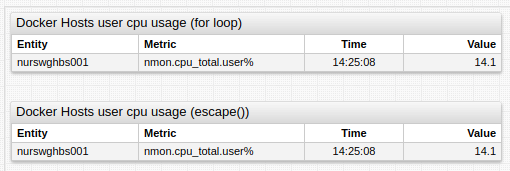
var entities = getEntities("docker-hosts", "name LIKE 'nur*'")
/api/v1/entity-groups/docker-hosts/entities?expression=name%20LIKE%20%27nur*%27
Result:
["nurswghbs001", "nurswgdkr002"]
getTags()
Description:
- Loads a series for
metricandentityfrom a defined URL whose last data point has timestamp afterminInsertDateand beforemaxInsertDate. - Additional
queryParameterscan be specified. - Unique tag values defined by
tagNameare retrieved from tags of the loaded series and sorted. - Returned array is processed by
list.escape()function.
Syntax:
getTags(metric, tagName, [entity, [minInsertDate, [maxInsertDate, [url, [queryParameters]]]]])
API Endpoint:
Sends synchronous GET request to
/api/v1/metrics/{metric}/series
Returned Value:
Array<string>: unique sorted values of the specified tagName series tag.
Arguments:
| Name | Type | Description |
|---|---|---|
metric | string | [Required] metric path parameter. |
tagName | string | [Required] Tag values retrieved from series descriptors. |
entity | string | entity query parameter. |
minInsertDate | string | minInsertDate query parameter. |
maxInsertDate | string | maxInsertDate query parameter. |
url | string | Protocol, host, and path to which /api/v1 path is appended. |
queryParameters | object | Object with parameter names as keys and values as values, transformed to query parameters string. |
Retrieve values for mount_point tag in a series for metric disk_used and entity nurswgvml007 received today
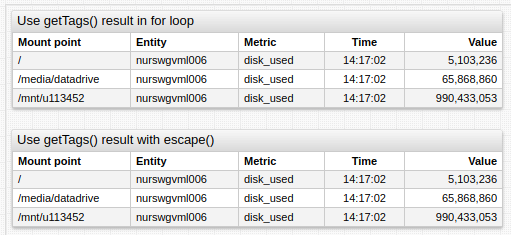
Syntax:
var mount_points = getTags("disk_used", "mount_point", "nurswgvml006", "current_day")
Request Sent:
/api/v1/metrics/disk_used/series?tag=mount_point&entity=nurswgvml006&minInsertDate=current_day
Result:
["/", "/media/datadrive", "/mnt/u113452"]
Retrieve values for mount_point tag in a series for metric disk_used and entity nurswgvml007 and send server-specific query parameter cache and ignore other parameters

Syntax:
var mount_points = getTags("disk_used", "mount_point", "nurswgvml007", null, null, null, {cache: true})
Request Sent:
/api/v1/metrics/disk_used/series?cache=true&tag=mount_point&entity=nurswgvml007
Result:
["/", "/media/datadrive", "/mnt/u113452"]
getSeries()
Description:
- Loads a series for the
metricand theentityfrom a defined URL, whose last data point has a timestamp afterminInsertDateand beforemaxInsertDate. - Specify additional
queryParameters. - Returns a loaded series.
Syntax:
getSeries(metric, [entity, [minInsertDate, [maxInsertDate, [url, [queryParameters]]]]])
API Endpoint:
Sends synchronous GET requests to the
/api/v1/metrics/{metric}/series
Returned Value:
Array<object>: Received series descriptors.
Arguments:
| Name | Type | Description |
|---|---|---|
metric | string | [Required] metric path parameter. |
entity | string | entity query parameter. |
minInsertDate | string | minInsertDate query parameter. |
maxInsertDate | string | maxInsertDate query parameter. |
url | string | Protocol, host, and path to which /api/v1 path is appended. |
queryParameters | object | Object with parameter names as keys and values as values, transformed to query parameters string. |
Return series for metric disk_used and entity nurswgvml006

Syntax:
var seriesDescriptors = getSeries("disk_used", "nurswgvml007")
Request Sent:
/api/v1/metrics/disk_used/series?entity=nurswgvml007
Result:
[
{
"metric":"disk_used",
"entity":"nurswgvml007",
"tags":{
"file_system":"/dev/mapper/vg_nurswgvml007-lv_root",
"mount_point":"/"
},
"lastInsertDate":"2017-08-15T15:30:25.000Z"
},
{
"metric":"disk_used",
"entity":"nurswgvml007",
"tags":{
"file_system":"172.17.0.2:/home/store/share",
"mount_point":"/mnt/share"
},
"lastInsertDate":"2015-12-25T14:09:49.000Z"
},
{
"metric":"disk_used",
"entity":"nurswgvml007",
"tags":{
"file_system":"//u113452.your-backup.de/backup",
"mount_point":"/mnt/u113452"
},
"lastInsertDate":"2017-06-21T13:26:00.000Z"
}
]
Drop-down List Value Function Arguments
FieldPath _(optional, type: string)
fieldPathis the dot-separated path to field in series descriptor object.- If not specified, series descriptor objects are returned.
- If specified, the field found by
fieldPathis returned.
fieldPath "entity"inheritsentityfrom each descriptor.
To populate the drop-down list with the names of entities for which the metric is collected use the following syntax:
[dropdown]
options = javascript: requestMetricsSeriesValues("entity")
change-field = series.entity
The content of the resulting drop-down list is shown below:
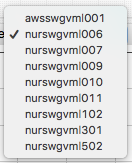
To populate the drop-down list with values of the mount_point tag use the following syntax:
The
fieldPath"tags.mount_point"readstagsin each descriptor then retrieves themount_pointfield.
[dropdown]
options = javascript: requestMetricsSeriesValues("tags.mount_point")
change-field = series.tags.mount_point
The content of the resulting drop-down list is shown below:

Callback _(optional, type:function)
- Use
callbackfor manual processing of series descriptors or additional processing of retrieved field values.- If
fieldPathis specified, the string values of some field are passed as the argument for the callback, otherwise the series descriptor array is used as the argument.
- If
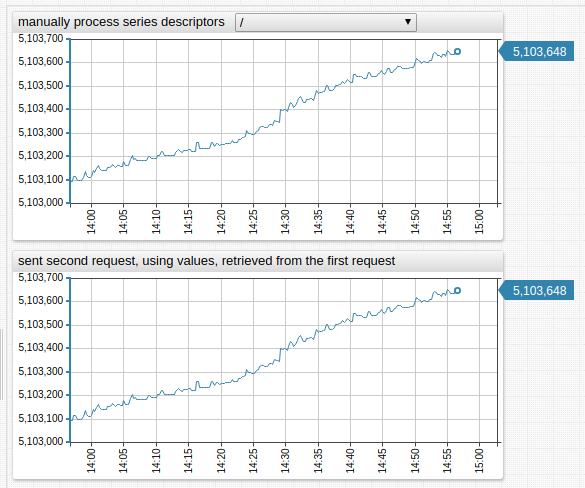
To fill the drop-down list with values of mount_point tag of the series, whose entity name begins with the fragment nur use the function as shown below.
Note that the series can be filtered by entity using the expression
queryParameter.
[dropdown]
change-field = series.tags.mount_point
options = javascript: requestMetricsSeriesValues(null,
options = function (series) {
options = var mountPoints = [];
options = series.forEach(function(s){
options = if(s.entity.indexOf("nur") === 0 && mountPoints.indexOf(s.tags.mount_point) < 0) {
options = mountPoints.push(s.tags.mount_point);
options = }
options = });
options = return mountPoints.sort();
options = })
The content of the resulting drop-down list is shown below:
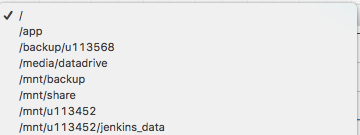
To populate the drop-down list with entity tag values it is necessary to make two requests:
- Retrieve entity names from series descriptors.
- Request entity tags for those entities.
[dropdown]
change-field = series.entity
options = javascript: requestMetricsSeriesValues("entity",
options = function (entities) {
options = return requestPropertiesOptions("entity", "tags.app", null, entities);
options = })
The content of the resulting drop-down list is shown below:
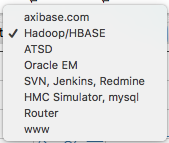
requestMetricsSeriesOptions()
Description:
- Request series for the
metricand addqueryParametersto the requested URL. - Creates an option for each loaded series.
- The value of the field found by
valueFieldPathis assigned to the option value. - The value of the field found by
textFieldPathis assigned to the option text.- If
textFieldPathis an array, it sequentially tries to find a field by every path.
- If
- When field is found it is assigned to the option text.
- If
callbackfunction is specifiedvalueFieldPathandtextFieldPathare ignored.
- If
callbackretrieves the loaded series as an argument and returns an array of options, where at least the value must be specified.
Syntax:
requestMetricsSeriesValues([fieldPath, [callback, [metric, [unique, [queryParameters]]]]])
Scope of Usage:
Use in [dropdown] field options setting after javascript: prefix.
API Endpoint:
Sends asynchronous GET request to
/api/v1/metrics/{metric}/series
Returned Value:
Array<{value: string, text: string}>: options, generated from series descriptor fields.
Arguments:
| Name | Type | Description |
|---|---|---|
valueFieldPath | string | Dot-separated path to the field, whose value is used as option value. |
textFieldPath | string or Array | Dot-separated path (or array of such paths) to the field, whose value is used as option text. |
callback | function | Function to process series descriptors, returns array of options. |
metric | string | Metric, for which series are loaded. If not specified, metric from the [widget] section is used. |
unique | boolean | Applied to raw series descriptors. |
queryParameters | string/object | String or key-value object representing request parameters. |
Examples:
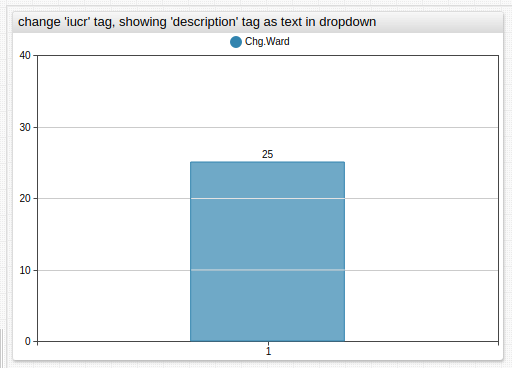
To fill the drop-down list with options with the value of the iucr tag and the text from the description tag, use the following syntax:
[dropdown]
options = javascript: requestMetricsSeriesOptions("tags.iucr", "tags.description")
change-field = series.tags.iucr
The content of the resulting drop-down list is shown below:
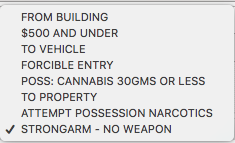
requestEntitiesMetricsOptions()
Description:
- Requests metrics for the
entityaddingqueryParametersto the requested URL. - Creates an option for each loaded metric.
- The value of the field found by
valueFieldPathis assigned to the option value. - The value of the field found by
textFieldPathis assigned to the option text.- If
textFieldPathis an array, it sequentially tries to find a field by every path.
- If
- When a field is found it is assigned to the option text.
- If
callbackfunction is specifiedvalueFieldPathandtextFieldPathare ignored.
- If
callbackgets loaded metrics as an argument and returns an array of options, where at least the value must be specified.
Syntax:
requestEntitiesMetricsValues([fieldPath, [callback, [entity, [unique, [queryParameters]]]]])
Scope of Usage:
Use in [dropdown] field options setting after javascript: prefix.
API Endpoint:
Sends asynchronous GET request to
/api/v1/entities/{entity}/metrics
Returned Value:
Array<{value: string, text: string}>: options, generated from metrics descriptors fields.
Arguments:
| Name | Type | Description |
|---|---|---|
valueFieldPath | string | Dot-separated path to the field, whose value is used as option value. |
textFieldPath | string or Array | Dot-separated path, or array of paths, to the field whose value is used as option text. |
callback | function | Function to process series descriptors. Returns array of options. |
entity | string | Entity, for which metrics descriptors are loaded. If not specified, entity from [widget] is used. |
unique | boolean | Applied to raw series descriptors. |
queryParameters | string/object | String or key-value object representing request parameters. |
Examples:
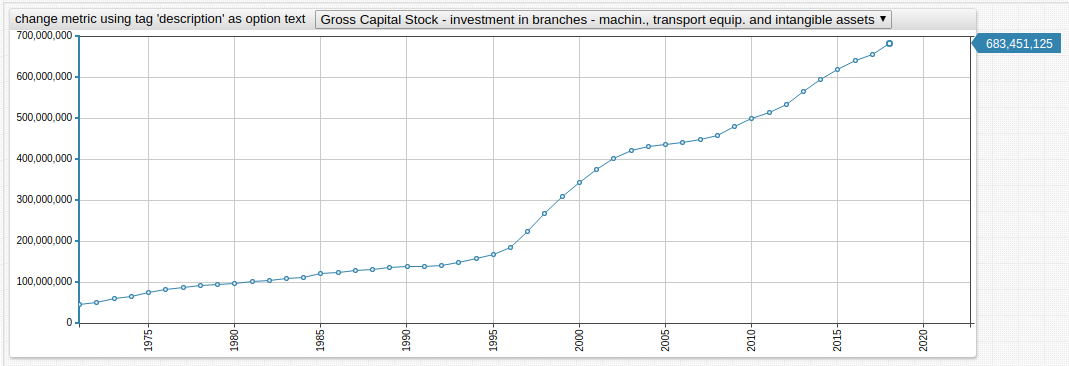
To fill the drop-down list with options defined by the value of the iucr tag and text from the description tag, use the following syntax:
[dropdown]
options = javascript: requestEntitiesMetricsOptions("name", "tags.description", null, null, null,{tags:"*",limit:15})
change-field = metric
The content of the resulting drop-down list is shown below:
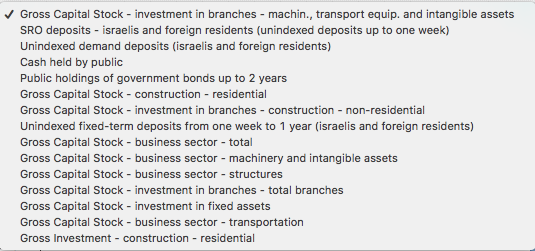
requestPropertiesOptions()
Description:
- Requests the entity tags or properties for the entity or the entities specified by the
entityparameter.- If
postBodyis specified,entityandpropertyTypeparameters are ignored.
- If
- Function requests entity tags if
$entity_tagsis specified aspropertyType, or otherwise requests properties. - Creates an option for each loaded tag or property object.
- The value of the field found by
valueFieldPathis assigned to the option value. - The value of the field found by
textFieldPathis assigned to the option text.- If
textFieldPathis an array, the function sequentially tries to find a field at each path.
- If
- When a field is found it is assigned to the option text.
- If
callbackfunction is specified, thevalueFieldPathandtextFieldPathparameters are ignored.
- If
callbackgets loaded tags/properties as an argument and returns an array of options, where at least the value must be specified.
Syntax:
requestPropertiesOptions([valueFieldPath, [textFieldPath, [callback, [entity, [propertyType, [unique, [postBody]]]]]]])
Scope of Usage:
Use in [dropdown] field options setting after javascript: prefix.
API Endpoint:
Sends asynchronous POST request to
/api/v1/properties/query.
Returned Value:
Array<string>: options, generated from the property or entity descriptors fields.
Arguments:
| Name | Type | Description |
|---|---|---|
valueFieldPath | string | Dot-separated path to the field, whose value is used as option value. |
textFieldPath | string or Array | Dot-separated path (or array of such paths) to the field, whose value is used as option text. |
callback | function | Function to process series descriptors, returns array of options. |
entity | string or Array | entity or entities, for which properties descriptors are loaded. If not specified, entities or entity from the [widget] section is used. |
propertyType | string | Type of loaded properties, default is $entity_tags. |
unique | boolean | Applied to raw series descriptors. |
postBody | object | Body of Data API properties query. |
Examples:
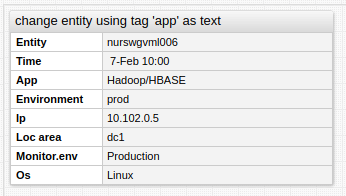
To fill drop-down list with values from entity and text from tag app, use the following syntax:
[dropdown]
options = javascript: requestPropertiesOptions("entity", "tags.app", null, ["nurswgvml006","nurswgvml007", "nurswgvml010", "nurswgvml301", "nurswgvml502"], "$entity_tags")
change-field = entity
The content of the resulting drop-down list is shown here:

TextFieldPath _(optional, type: string/Array<string>)_
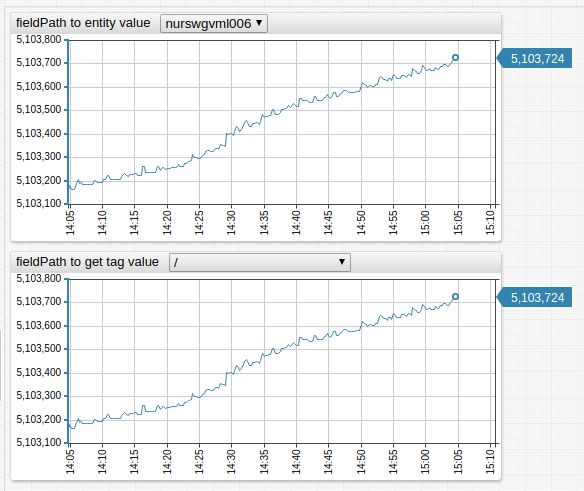
textFieldPath are the period-separated paths to a field in a series descriptor object, or an array of such paths. If it is an array then all elements other than the first are used as text. If textFieldPath is not specified or search on all paths failed the value is used as text.
To fill a drop-down list with options in which values are retrieved from the name field of the metric descriptor and text from the tag description, textFieldPath as string can be used.
[dropdown]
options = javascript: requestEntitiesMetricsOptions('name', 'tags.description', null, null, null, {tags:'*',limit:15})
change-field = metric
Below is the content of the drop-down list:
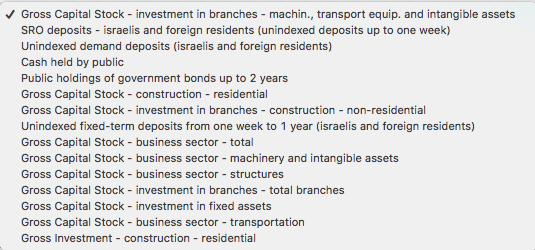
Fill the drop-down list with values retrieved from the name field of the metric descriptor and the text from the tag description or tag documentation, if the descriptor has no value for the tag description, textFieldPath as an array can be used
[dropdown]
options = javascript: requestEntitiesMetricsOptions('name', ['tags.description','tags.documentation'], null, null, null, {tags:'*',limit:15})
change-field = metric
Below is the content of the drop-down list:
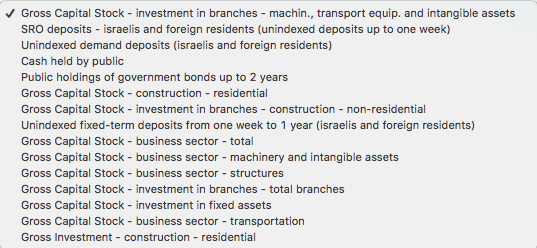
Callback _(optional, type:function)_
- Use
callbackfor manual processing of descriptors, which are passed as parameters.- If
callbackis specified,valueFieldPathandtextFieldPathare ignored.
- If
- Function returns an array of objects, representing options.
[
...
{
value: string,
text: string
}
...
]
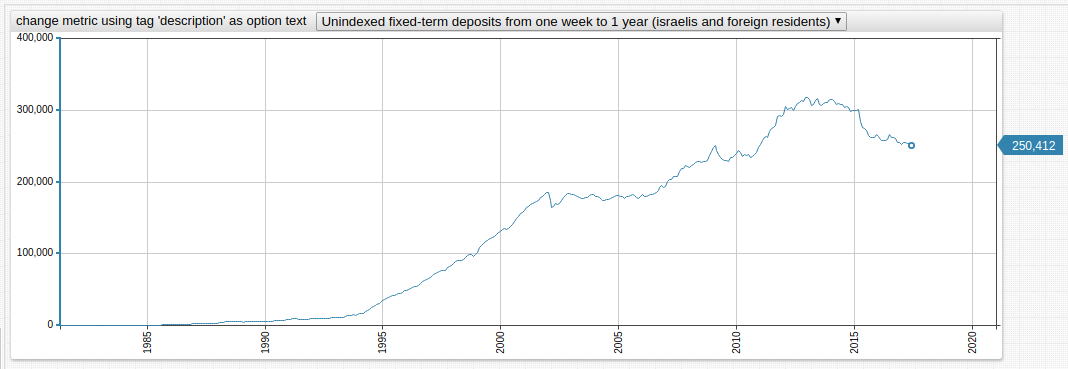
To populate the drop-down list with the names of metrics, collected for the entity, and texts which are changed values of the description tag, use the following syntax:
[dropdown]
change-field = metric
options = javascript: requestEntitiesMetricsOptions(null, null, function(metrics) {
options = return metrics.map(function(m) {
options = return {
options = value: m.name,
options = text: m.tags.description.replace('Gross Capital Stock', 'GCS')
options = }
options = });
options = }, null, null, {tags:'*',limit:15})
The contents of the resulting drop-down list are shown here:
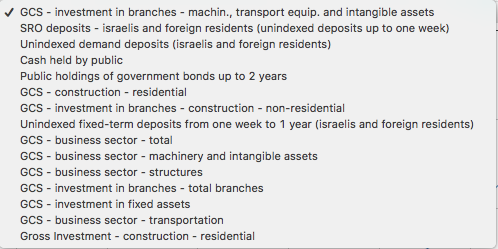
requestMetricsSeriesValues()
Description:
- Requests series for
metricand addsqueryParametersto the requested URL.- If
fieldPathis specified retrieves fields found byfieldPathin the series. - If
uniqueis specified retrieved values are unique and sorted. - If
callbackfunction is specified, the array of retrieved fields or the array of loaded series as an argument is returned, whether or notfieldPathis specified.
- If
- Returns array of options, objects with
valueproperty set to the retrieved and processed value.
Syntax:
requestMetricsSeriesValues([fieldPath, [callback, [metric, [unique, [queryParameters]]]]])
Scope of Usage:
Use in [dropdown] field options setting after javascript: prefix.
API Endpoint:
Sends asynchronous GET requests to
/api/v1/metrics/{metric}/series
Returned Value:
Array<string>: Values fill the drop-down list, retrieved from series descriptors.
Arguments:
| Name | Type | Description |
|---|---|---|
fieldPath | string | Dot-separated path to the field, whose value is retrieved. |
callback | function | Function to process series descriptors or retrieved values. |
metric | string | Metrics, for which series are loaded. If not specified, metric from the [widget] section is used. |
unique | boolean | Specify if retrieved values are unique and sorted Default value: true. |
queryParameters | string/object | String or key-value object representing request parameters. |
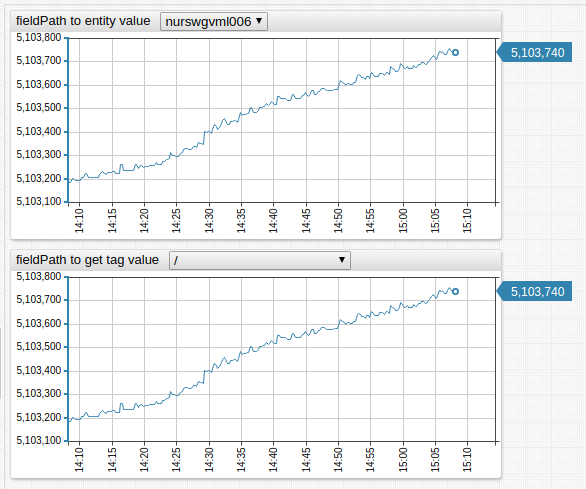
The fieldPath "tags.mount_point" reads tagsin each descriptor then retrieves the mount_point field.
[dropdown]
options = javascript: requestMetricsSeriesValues("tags.mount_point")
change-field = series.tags.mount_point

requestEntitiesMetricsValues()
Description:
- Requests metrics for the
entityaddingqueryParametersto the requested URL.- If
fieldPathis specified, retrieves fields found byfieldPathin the metric. - If
uniqueis specified, retrieved values are both unique and sorted. - If
callbackfunction is specified, the function returns the array of retrieved fields or the array of loaded metrics as argument, whether or notfieldPathis specified.
- If
- Returns the array of options - objects with
valueproperty set to the retrieved and processed value.
Syntax:
requestEntitiesMetricsValues([fieldPath, [callback, [entity, [unique, [queryParameters]]]]])
Scope of Usage:
Use in [dropdown] field options setting after javascript: prefix.
API Endpoint:
Sends asynchronous GET requests to
/api/v1/entities/{entity}/metrics
Returned Value:
Array<string>: values to fill the drop-down list, retrieved from metric descriptors.
Arguments:
| Name | Type | Description |
|---|---|---|
fieldPath | string | Dot-separated path to the field, whose value is retrieved. |
callback | function | Function to process series descriptors or retrieved values. |
entity | string | Entity, for which metric descriptors are loaded. If not specified, entity from the [widget] section is used. |
| unique | boolean | Specify whether retrieved values be unique and sorted, default is true. |
queryParameters | string/object | string or key-value object representing request parameters. |
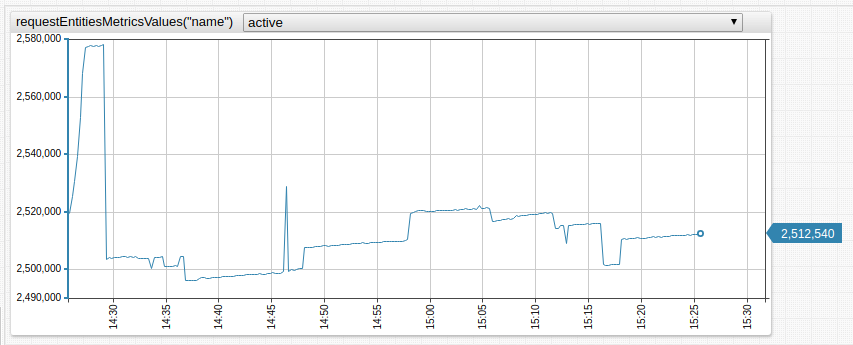
To populate the drop-down list with names of metrics collected for the entity use the following syntax:
[dropdown]
options = javascript: requestEntitiesMetricsValues("name")
change-field = series.metric
The content of the resulting drop-down list is shown below:
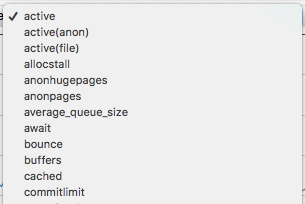
requestPropertiesValues()
Description:
- Requests entity tags or properties for the entity or entities specified by the
entityparameter.- If
postBodyis specified,entityandpropertyTypeparameters are ignored.
- If
- Function requests entity tags if
$entity_tagsis specified aspropertyType, or if not, requests properties.- If
fieldPathis specified retrieve fields found byfieldPathin the entity tags or properties. - If
uniqueis specified retrieved values are both unique and sorted. - If
callbackfunction is specified, it is applied to the array of retrieved fields or the array of entity tags/properties, whether or notfieldPathis specified.
- If
- Returns the array of options, objects with
valueproperty set to the processed retrieved value.
Syntax:
requestPropertiesValues([valueFieldPath, [textFieldPath, [callback, [entity, [propertyType, [unique, [postBody]]]]]]])
Scope of Usage:
Use in [dropdown] field options setting after javascript: prefix.
API Endpoint:
Sends asynchronous POST requests to
/api/v1/properties/query
Returned Value:
Array<string>: Values to fill the drop-down list, retrieved from properties descriptors.
Arguments:
| Name | Type | Description |
|---|---|---|
fieldPath | string | Dot-separated path to the field, whose value is retrieved. |
callback | function | Function to process series descriptors or retrieved values. |
entity | string, array | Entity or entities, for which properties descriptors are loaded. If not specified, entities or entity from the [widget] section is used. |
propertyType | string | Type of loaded properties. Default setting: $entity_tags. |
unique | boolean | Specifies whether retrieved values are unique and sorted. Default value: true. |
postBody | object | Body of Data API Properties Query. |

To populate the drop-down list with the id of network properties use the following syntax:
[dropdown]
options = javascript: requestPropertiesValues("key.id", null, null, "network")
change-field = property.keys.id
The content of the resulting drop-down list is shown below:
